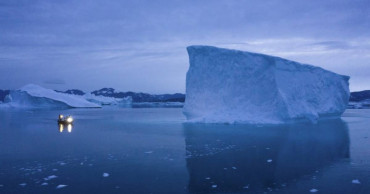United Nations Development Programme (UNDP)
Conserve Bangladesh hill forests to save it from climate disaster: Speakers
Speakers at a consultation on the formulation of the National Adaptation Plan (NAP) on Sunday stressed the conservation of the hill forests in Bandarban to save the region from climate disaster.
The consultation was jointly organised by the Ministry of Environment, Forest and Climate Change (MoEFCC), Economic Relations Division (ERD) and United Nations Development Programme (UNDP) with support from the Green Climate Fund (GCF).
The speakers expressed concerns over the native species destroying plantation and horticulture practices. Although horticulture is bringing economic benefit to the farmers, rampant use of pesticides has emerged as a major threat to biodiversity, they said.
Considering different vulnerability factors including extreme level water scarcity, deforestation, worsening biodiversity, flash flood Bandarban district was selected to conduct the consultation.
Bandarban has been ranked second among the climate-vulnerable 10 hotspots in Bangladesh.
Read: Massive mangrove forestry planned to protect wildlife and expand forest coverage
The country on the other hand is ranked seventh among the climate-vulnerable countries globally (South Asian hotspots, World Bank, 2018).
Additional Secretary of the MoEFCC and National Project Director of the National Adaptation Plan (NAP) Formulation Project Md Mizanul Haque Chowdhury informed the participants about Bangladesh’s priorities outlined in SDG, Delta Plan 2100, Perspective plan, five-year plan and its ambition to graduate from a Least developed country to a middle-income country.
“We are committed to implementing the Glasgow Climate Pact signed during the COP26. We will work in close coordination with all the public and private entities, development partners and the people to keep the temperature well below 1.5 degrees Celsius and protect the biodiversity”
He explained that the objective of the consultation was to understand the local vulnerability issues and get feedback from the participants on these for incorporation in the NAP.
Mizanul Haque was present as the chief guest while Amal Krishna Mandal, Join Secretary, Wing Chief, Economic Relations Division (ERD) was present as the special guest.
Bandarban Deputy Commissioner Yasmin Parvin Tibriji, chaired the consultation.
More than 80 representatives from district administration, local government representatives, civil society representatives, sectoral experts, professionals, journalists and academia attended the event and provided their valuable comments and feedback to enrich the plan with locally specific climate adversities and adaptation needs.
Participants from different parts of the Rangamati and Khagrachari districts joined over zoom.
While delivering the keynote presentation, Professor Dr Ainun Nishat, Team Leader of the NAP Formulation Consortium said, “We will incorporate the locally-led adaptation practices in the NAP”.
He drew examples from the changing patterns of the climate and added that Chattogram Hill Tracts is heavy rainfall region and it is a major contributing factor to flash floods causing havoc.
“We have to adopt measures on how to tackle such challenges”, he said.
For successful implementation of the NAP, he underlined incorporation of the NAP in the local, national and sub-national development planning and transformative capacity building.
Khan Jamal Lusai, botanist and former academic emphasised on maintaining the navigability of the rivers and regular flow of water in the hill Charas would transform the life and livelihood of the hill people.
“As there is no cultivable plain land, the hill people have no other choice but to do Jhum cultivation and produce cotton, vegetables and fruits”.
He also said that Jhum cultivation is not as productive as it was in the past.
“We need to look beyond Jhum cultivation and introduce economic activities that support the livelihood of the hill people,” he said.
Ripon Chakma, executive director of Trinomul Unnayan Sangstha said that Use of herbicide and pesticide in mango cultivation is destroying the hill ecosystem. Large scale horticulture destroying the native species is likely to harm the ecosystem and biodiversity in the entire hill tracts regions.
Rafiqul Islam, deputy director, Department of Agricultural Extension said, “We can consider conducting a study on season-specific availability of water in different regions. Based on the findings, we can erect permanent dam and reservoirs on an experimental basis and harvest rainwater”.
Buddhojoti Chakma, Correspondent of Prothom Alo said that destroying the biodiversity will only result in destroying the natural sources of water.
Monirul Islam Monu of Kalerkantho said that Introduction of exotic horticulture without any study can be deadly for the biodiversity of the hill region.
“Furthermore, we must stop burning our forests in the illegal brick fields and stone excavation.”
Read:Environmental organizations protest dysfunction of rules to protect forest-wild animals
A K M Azad Rahman, Programme Officer-Climate Change, UNDP said, “Bandarban and the entire CHT needs special adaptation measures” He advocated for Village Common Forest (VCF), a traditional practice to conserve community land for ecosystem services among other adaptation measures.
Amal Krishna Mandal said, “We are confident that we will have a country driven NAP that will document locally led adaptation efforts”.
Yasmin Parvin thanked the participants and said that The NAP should put utmost priority on solving the water crisis and land slide in the Bandarban as well as the entire CHT region.
“We will continue such dialogues with all the relevant public agencies and stakeholders to address our local problem in a coordinated way.”
The country on the other hand is ranked seventh among the climate-vulnerable countries globally (South Asian hotspots, World Bank, 2018).
4 years ago
Jaya Ahsan becomes UNDP goodwill ambassador
The United Nations Development Programme (UNDP) has appointed actress, producer and social activist Jaya Ahsan as its goodwill ambassador for Bangladesh for a year, starting in January.
The voluntary service and support of Jaya as the goodwill ambassador will spotlight important issues like Sustainable Development Goals (SDGs) to mobilise support and raise awareness in achieving the goals by 2030.
Read:UNDP, BDF launch “Youth Against Corruption” campaign
"We are fortunate to have Jaya Ahsan, who is not only a very celebrated artiste but also a person committed to social good, to be our goodwill ambassador," said Sudipto Mukerjee, resident representative of the UNDP Bangladesh.
"Having her with us will help to amplify our call to everyone within and beyond Bangladesh to join the UNDP's efforts towards a healthier, happier and more equal planet that seeks to leave no one behind," he added.
"I am honoured to be named the goodwill ambassador of the UNDP and extremely privileged to join the team in working towards these goals," Jaya said.
Read: UNDP, BWJA seal deal to address, redress violence against women
"I will advocate and mobilise action to work on SDGs through online and offline media and all other platforms I have access to," she added.
Jaya will also work with the UNDP to raise public awareness and galvanise support for different campaigns on poverty, governance, resilience, environment, energy and gender equality.
4 years ago
Extinct dinosaur lectures world leaders about climate change
World leaders at the UN headquarters got a discourse from a talking dinosaur -- an extinct species -- in a creative video launched by United Nations Development Programme (UNDP) to help create awareness about climate change.
The short film, launched as the centerpiece of the UN agency's new ‘Don’t Choose Extinction’ campaign, has also been tweeted by the United Nations.
Bursting into the iconic General Assembly Hall, famous for history-making speeches by leaders from around the world, the imposing dinosaur tells an audience of shocked and bewildered diplomats and dignitaries that “it’s time humans stopped making excuses and started making changes” to address the climate crisis.
“At least we had an asteroid,” the dinosaur warns, referring to the popular theory explaining dinosaurs’ extinction 70 million years ago. “What’s your excuse?”
Read: EU lauds Bangladesh’s leadership on climate front
This first-ever film to be made inside the UN General Assembly using computer-generated imagery (CGI) features global celebrities voicing the dinosaur in numerous languages, including actors Eiza González (Spanish), Nikolaj Coster-Waldau (Danish), and Aïssa Maïga (French).
The dinosaur goes on to highlight how financial support for fossil fuels through subsidies -- taxpayers’ money that helps keep the cost of coal, oil and gas low for consumers -- is irrational and illogical in the face of a changing climate.
“Think of all the other things you could do with that money. Around the world people are living in poverty. Don’t you think that helping them would make more sense than… paying for the demise of your entire species?” the dinosaur says.
"The film is fun and engaging, but the issues it speaks to could not be more serious,” said Ulrika Modéer, Head of UNDP’s Bureau for External Relations and Advocacy.
“The UN Secretary-General has called the climate crisis a ‘code red for humanity'. We want the film to entertain, but we also want to raise awareness of just how critical the situation is. The world must step up on climate action if we are to succeed in keeping our planet safe for future generations.”
Read: Australia to keep supporting Bangladesh in combating climate change: Envoy
UNDP’s ‘Don’t Choose Extinction’ campaign and film aim to shine a spotlight on fossil fuel subsidies and how they are cancelling out significant progress towards ending climate change and are driving inequality by benefitting the rich, the agency said in a statement released Thursday.
UNDP research released as part of the campaign shows that the world spends an astounding USD 423 billion annually to subsidise fossil fuels for consumers -- oil, electricity generated by the burning of other fossil fuels, gas, and coal.
This could cover the cost of Covid-19 vaccinations for every person in the world, or pay for three times the annual amount needed to eradicate global extreme poverty.
The ‘Don’t Choose Extinction’ film was created in partnership with Activista Los Angeles (a multiple award-winning creative agency), David Litt (US President Barack Obama’s speechwriter) and Framestore (the creative studio behind James Bond, Guardians of the Galaxy, Avengers End Game).
4 years ago
Alliance for Rural Electrification awards solar mini-grid projects in Bangladesh
The Infrastructure Development Company Limited, or IDCOL, a non-bank financial institution under the Ministry of Finance, has won the Alliance for Rural Electrification (ARE) award in the “Multilateral/International Organisation” category for financing a series of solar mini-grid projects that have brought the dream of universal access to electricity in Bangladesh closer to reality, indeed very close now.
5 years ago
Rohingya Repatriation: UNDP, UNHCR, Myanmar extend MoU
The UN Development Programme (UNDP), and the UN Refugee Agency (UNHCR) on Monday agreed with the government of Myanmar to extend the tripartite Memorandum of Understanding (MoU) for activities in Rakhine State amid no repatriation of Rohingyas from Bangladesh.
5 years ago
UNDP, United Group provide food support to 5000 vulnerable women
In response to the COVID-19 pandemic, United Nations Development Programme (UNDP) and United Enterprises & Co. Ltd (UECL) have jointly taken an initiative to provide food support to almost 5000 poor women in Jamalpur, Kurigram and Ganbandha districts.
5 years ago
UN launches world’s biggest survey of public opinion on climate change
Celebrities and youth activists on Thursday met with UN officials, governments and civil society to launch Mission 1.5, a campaign that aims to bridge the gap between people and governments on ambitious climate action.
6 years ago
.jpg)



.jpg)
.jpg)


